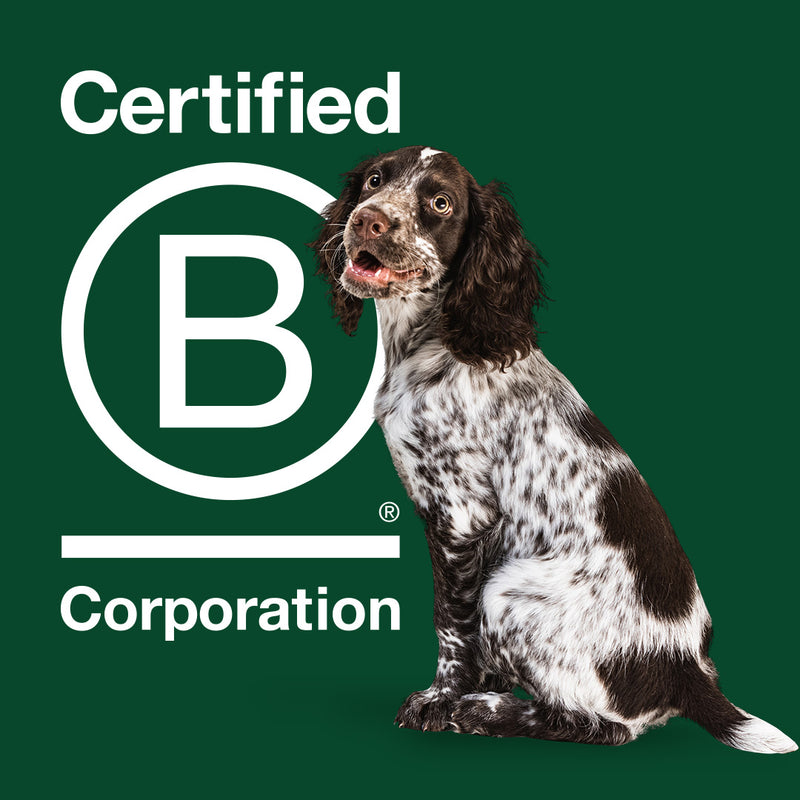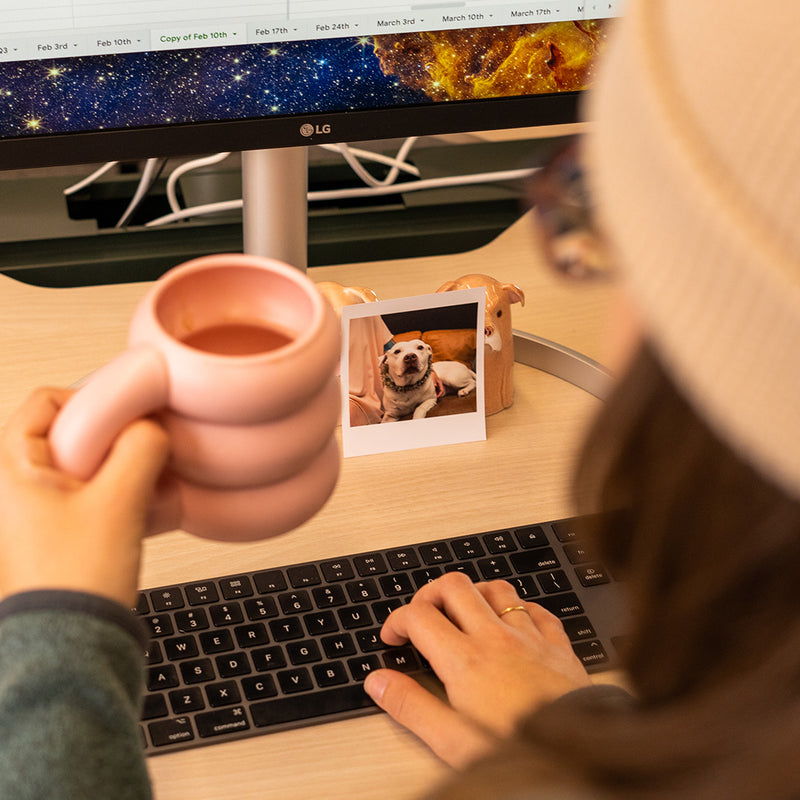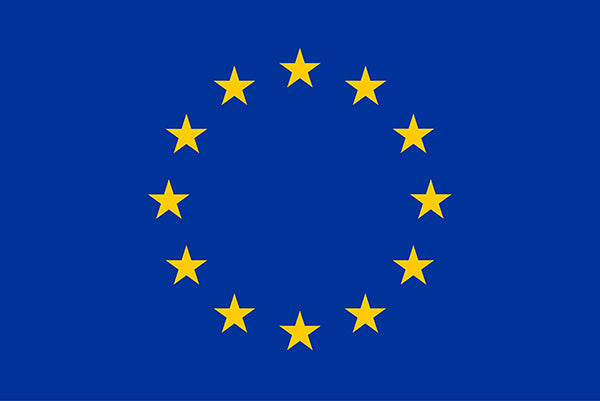Does your dog love to lick their paws? While occasional paw chewing or licking is usually nothing to worry about, if it occurs suddenly or frequently it could indicate something is seriously wrong.
It’s important to identify the underlying cause of this behavior to know when to seek advice from your veterinarian. Read on for a rundown on 7 of the most common reasons why dogs lick or chew their paws.
1. Grooming
The simplest reason for casual paw licking? Your dog might just be enjoying a nice tongue bath. While they don’t spend as much time grooming as cats do, healthy dogs lick their paws to stay clean and will nibble at anything lodged in their feet to get the offender unstuck.
It’s normal for dogs to lick both paws infrequently. However, if your dog seems obsessed or if they focus on one paw in particular, there could be cause for concern. Read on to find out the more alarming issues potentially motivating your dog’s strange behavior.
To ensure your dog stays clean and healthy, and to help minimize excessive paw licking, consider incorporating Earth Rated’s dog grooming products into your routine. With a variety of coat-specific dog shampoos and versatile grooming essentials, Earth Rated makes grooming simple and effective.
Why Choose Earth Rated?
Groomers often use a variety of products based on your dog’s coat type and needs, including shampoos, conditioners, and deodorizing agents. Earth Rated’s 3-in-1 shampoos offer the same benefits at home, combining cleaning, hydrating, and deodorizing in one simple product. Our dog shampoos are specifically formulated for canine skin and coat, ensuring a balanced pH and optimal care.
Keep your dog clean, healthy, and happy with Earth Rated's premium grooming line. Explore our range of products and find the perfect solution for your dog's grooming needs.
Shop Earth Rated Dog Grooming Products
2. Allergies
A major reason for paw chewing or licking? Your dog could have allergies!
If you’ve noticed that your dog’s top priority after every walk is to obsessively lick their paws, they might have an environmental allergy. Grass pollen, pesticides and dust mites are all common culprits. Try using hypoallergenic dog wipes to clean their paws after walks to see if they tone down the licking.
If constant paw chewing is accompanied by itchy patches on your dog’s skin, a food intolerance may be to blame. The most common food allergies for dogs are beef, chicken and dairy. Try switching up their diet!
3. Behavioral Issues
Compulsive paw chewing could be a sign of underlying depression, anxiety, or boredom. When a dog experiences these issues, their body produces cortisol, a stress hormone, and they might lick to self-soothe.
During puppyhood, mother dogs spend a lot of time licking their young. As the puppies grow up, they learn to replicate this behavior as a way to calm down. So, if your dog has been compulsively licking and chewing their paws, they might be stressed out!
Dogs need mental and physical stimulation to stay healthy. An animal behaviorist can recommend activities to help deal with the cause of the problem. Try to exercise your dog, give them toys to play with and make an effort to socialize your adult dog.
4. Injury
You’ve heard the expression “licking your wounds”. Dogs live by it.
Injury is a common reason for sudden paw licking or chewing. Typical causes include insect stings or cuts from sharp objects such as splinters, shards of glass or rocks. Check your dog’s paws to see if anything is lodged in the skin of their pads.
Excess licking can also be a sign of a sprained leg or arthritis. If you notice your dog has been limping or appears to be in pain, take them to the vet.
5. Parasite or Yeast Infection
Fleas, ticks and mites are another cause for paw licking. Tick infestations are a growing problem, especially for dogs who walk in the woods. Saliva from bites is super itchy and licking or chewing can be your dog’s way of soothing the irritation. Parasites can be difficult to detect so it’s worth checking your pet regularly.
Another possible cause of itchy skin: fungal infections. When skin gets too oily, yeast can breed out of control and cause an infection. Dog breeds with skin folds are most susceptible to this. If your dog’s obsessive licking is accompanied by a strong, rancid smell, take them to a vet to test for an infection.
6. Dry Skin
Just like humans, dogs can get dry skin. This could be due to cold winter weather or a lack of fatty acids in your dog’s diet. Over-bathing is also a common culprit as it strips hair of natural oils.
Constant paw licking can cause chapped feet, which worsens the irritation and compounds the problem. If your dog’s paws are extra sore, talk with your vet to create an action plan.
Combat dry skin effortlessly! Use our gentle, chemical-free waterless dog shampoo to keep your furry friend’s coat healthy and fresh.
7. Winter
Ice-melting salts: great for car tires, terrible on your dog’s feet! Chemical burn might be to blame if your dog’s paws seem extra irritated during winter. Plus, snow can get caught in your dog’s pads or fur and form painful ice balls. If your poor pup’s paws are cracking and bleeding or if you suspect an injury, consult with your vet.
If your dog is chewing or licking their paws, it’s important to find out why. The reasons covered in this article are among the most common, but there may be other causes at the root of the problem. It’s always a good idea to seek professional advice from your veterinarian if paw chewing or licking has become a concern.
Detecting the Signs and Symptoms of Dogs Chewing Paws
Noticing the signs of a dog who may be chewing on their paws excessively requires some careful observation of both their behavior and their physical condition. The most common symptoms to look out for are of course redness, swelling, or hair loss around the paws. These symptoms can lead to potential irritation or even an underlying health issue.
If your dog is obsessively licking and chewing at their paws, and we're talking beyond normal grooming, this may indicate they're experiencing some discomfort or distress. Sudden behavioral changes, like becoming more agitated, licking or chewing, or if they're suddenly avoiding being touched, can also signal that the paw chewing needs some professional attention. These symptoms, especially when persistent, should prompt a consultation with your local vet to diagnose and treat the underlying cause.
How can I get my dog to stop chewing his paws?
To put an end to paw chewing, there's a few different approaches you can take, like combining natural remedies, preventive measures, and mental stimulation techniques. If you choose to go the natural remedies route stick to using gentle ingredients like aloe vera to help soothe irritation and reduce the urge to chew. Regular grooming and thorough paw inspections can also be a good way to prevent issues forming in the first place. Keeping your dog's nails trimmed and paws clean helps prevent discomfort that might cause chewing. Engaging your dog in mental stimulation through enrichment toys, puzzles, or training exercises can also help redirect their focus and reduce stress-related chewing. Providing enough daily exercise to your dog's routine can also help mitigate boredom or anxiety.
Not sure which grooming products to use? Let our grooming quiz guide you to the perfect choice! [Take the Quiz]
When to Seek Veterinary Help
When it comes to seeking professional help for your dog's paw chewing, it really depends on the severity and persistence of their symptoms. If you notice persistent redness, swelling, hair loss, or if the paw chewing is accompanied by any limping, signs of infection, or if your dog shows any signs of discomfort or distress, it's time to consult your vet. Symptoms like these could indicate underlying issues like allergies, infections, or even more serious conditions that require professional care.
Veterinarians can generally offer a comprehensive approach to diagnosing and treating the reasons behind paw chewing. They might refer you to conduct allergy tests, skin scrapings, or blood work to identify the root cause. Treatments can range from topical ointments and antibiotics to allergy medications, dietary changes, or even behavioral therapy if the chewing is stress-related. A vet can usually offer you some guidance on preventive care tailored to your dog's specific needs too.
Paws for Thought: Navigating Your Dog's Wellbeing
So, there you have it. Keeping your eye out for signs of excessive paw chewing and taking preventative measures at home can help improve your dog's wellbeing. Recognizing when to seek professional care is crucial for addressing more serious underlying conditions. Whether it's through natural remedies, preventive care, or medical treatment, every step you take is a leap forward in your dog's wellbeing journey.
Next article: 5 Reasons Why Dogs Lick People












